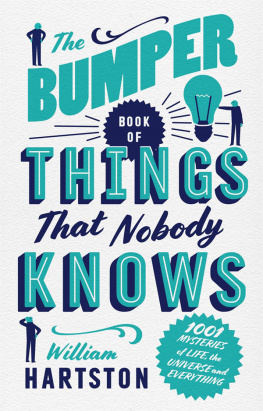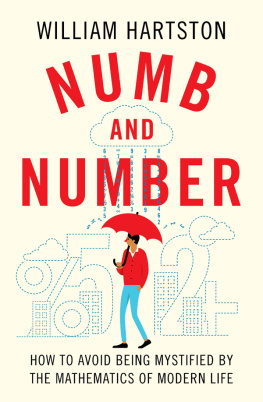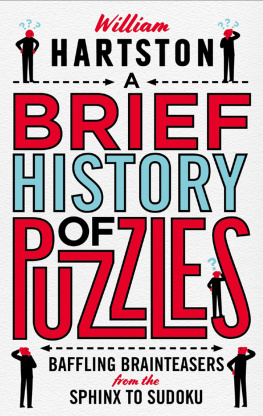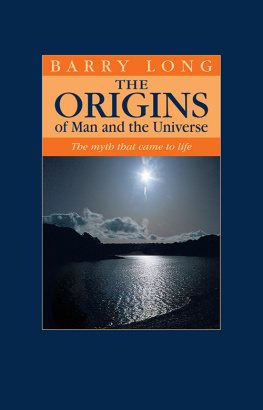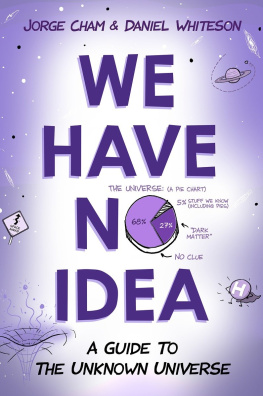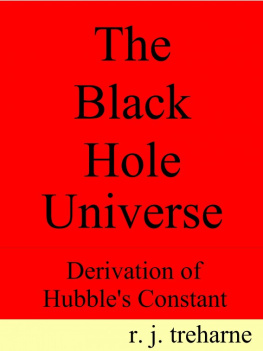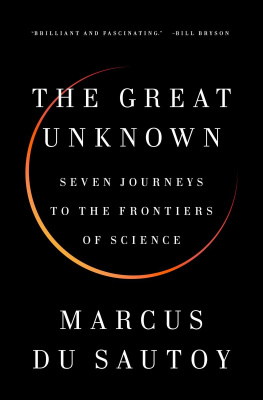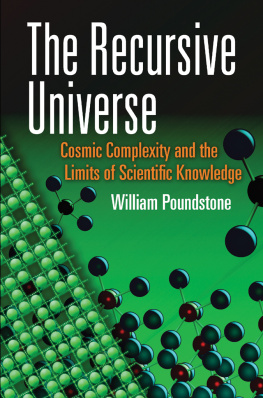Contents
Guide

Also by William Hartston
How to Cheat at Chess
The Penguin Book of Chess Openings
Soft Pawn
The Ultimate Irrelevant Encyclopedia
The Kings of Chess
Chess The Making of the Musical
The Drunken Goldfish and Other Irrelevant Scientific Research
How was it for you, Professor?
The Guinness Book of Chess Grandmasters
Teach Yourself Chess
Teach Yourself Better Chess
The Book of Numbers: The Ultimate Compendium of Facts About Figures
Mr Hartstons Most Excellent Encyclopedia of Useless Information
Forgotten Treasures: A Collection of Well-loved Poetry (Vols 1, 2 and 3)
The Things That Nobody Knows
Even More Things That Nobody Knows

This collection first published in hardback in Great Britain in 2017 by Atlantic Books, an imprint of Atlantic Books Ltd.
The Things That Nobody Knows first published in Great Britain in 2011 by Atlantic Books.
Even More Things That Nobody Knows first published in Great Britain in 2015 by Atlantic Books.
Copyright William Hartston, 2011, 2015, 2017
The moral right of William Hartston to be identified as the author of this work has been asserted by him in accordance with the Copyright, Designs and Patents Act of 1988.
All rights reserved. No part of this publication may be reproduced, stored in a retrieval system, or transmitted in any form or by any means, electronic, mechanical, photocopying, recording, or otherwise, without the prior permission of both the copyright owner and the above publisher of this book.
1 2 3 4 5 6 7 8 9
A CIP catalogue record for this book is available from the British Library.
Hardback ISBN: 978-1-78649-074-9
E-book ISBN: 978-1-78649-075-9
Printed in Great Britain
Atlantic Books
An Imprint of Atlantic Books Ltd
Ormond House
2627 Boswell Street
London
WC1N 3JZ
www.atlantic-books.co.uk
PREFACE
When Atlantic Books approached me in 2010 and asked if I could write a book containing 501 things that nobody knows, I was delighted to accept the challenge. Paradoxically, I had often felt that we learn more by thinking about the things we dont know than the things that we do. Its also much more fun. 501 unanswered questions later, The Things That Nobody Knows was born.
Three years later, they asked if I could do 501 more, which led to Even More Things That Nobody Knows, confirming that there is no limit to human ignorance. The book you are now reading comprises all the items from the earlier two books with one small amendment. Looking through the contents of both books, I found only one question that had been definitively answered and if you turn to item 200 from The Things That Nobody Knows, you will see what it is. On the plus side, this reduces the total number of Things That Nobody Knows listed in these pages from 1002 to 1001, which is a much more pleasing number. I hope you enjoy or are enlightened by at least some of them.
William Hartston
Cambridge 2017
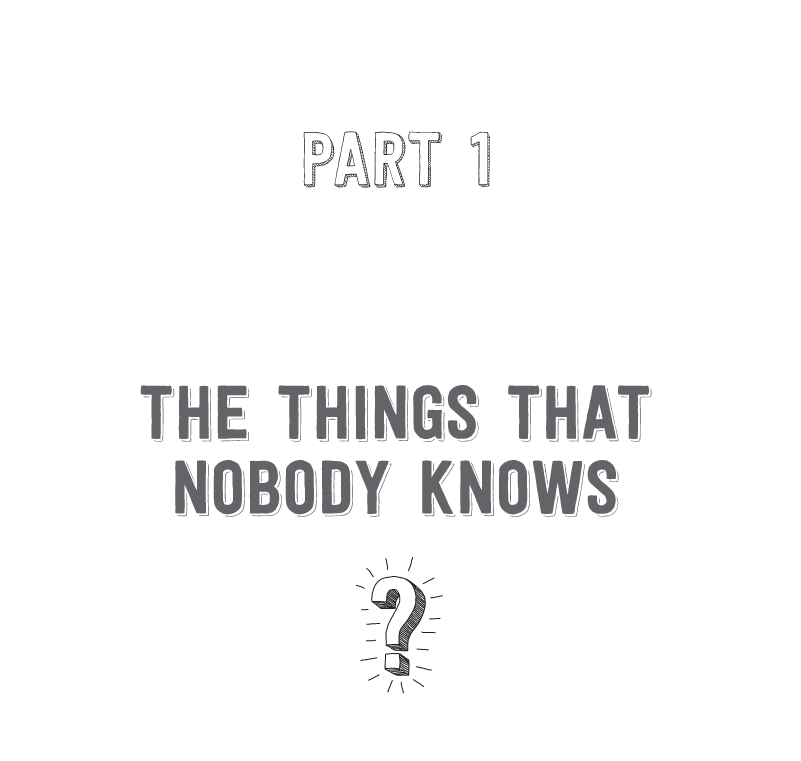
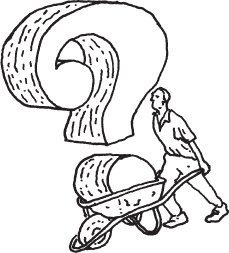
How can we remember our ignorance, which our growth requires, when we are using our knowledge all the time?
Henry David Thoreau (181762)
CONTENTS

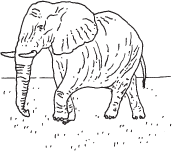

INTRODUCTION
Ignorance, Fruit-Fly Genitalia and the End of the World
There are known knowns. These are things we know that we know. There are known unknowns. That is to say, there are things that we now know we dont know. But there are also unknown unknowns. These are things we do not know we dont know.
Donald Rumsfeld, 12 February 2002
The trouble with people like Donald Rumsfeld is that they give ignorance a bad name. The US Secretary of State for Defense was generally derided when he made the clumsy statement quoted above, but he was just trying to remember a line from Confucius quoted by Henry David Thoreau in Walden (1854):
To know that we know what we know, and that we do not know what we do not know, that is true knowledge.
With the wisdom of Confucius supporting him, Thoreau went on to ask:
How can we remember our ignorance, which our growth requires, when we are using our knowledge all the time?
While Rumsfeld was simply categorizing different levels of not knowing, Confucius and Thoreau had a much more positive approach to ignorance, an approach that provides the basic raison dtre of this book. I come to praise ignorance, not to bury it; for there is no better key to understanding the vast and ever-growing expanse of human knowledge. The topics covered in the forthcoming pages are exactly what the book says on the cover: things that nobody knows. Many people, when I have mentioned the title of the book, have unjustifiably assumed it to be another of those not-many-people-know-that collections of useless information. It isnt. There may be a great number of such intriguing facts here, but they are only included when they are crucial to explain what nobody at all knows, and why nobody knows it.
More than three hundred years ago, the French philosopher and mathematician Blaise Pascal likened our knowledge to a sphere which, as it grows larger, inevitably increases the area with which it comes into contact with the unknown. Henry Miller put this more succinctly in The Wisdom of the Heart (1941):
In expanding the field of knowledge we but increase the horizon of ignorance.
This book is a guided tour around Millers horizon of ignorance.
When listening to scientists or other experts talking about the latest advances in their fields, I have always found it more intriguing, and generally more enlightening, when they get on to the subject of the things they dont know. Rumsfelds known unknowns are what determines the direction of future research and that is what makes ignorance so exciting.
According to a recent estimate in the on-line Ulrichsweb periodicals directory, there are around 300,000 academic journals currently being published around the world. These may come out weekly, monthly or less frequently, but the total number of issues of all these journals in any year must be over 3 million, and with an average in the region of ten papers in each journal, each reporting a previously unknown result, that adds up to over 30 million additions to our knowledge every year, which is around one every second. There has to be a vast amount of ignorance out there to keep all those journals in material, and the things that nobody knows that I have identified in the pages that follow only scratch the surface.

